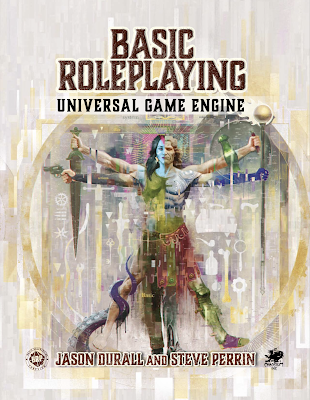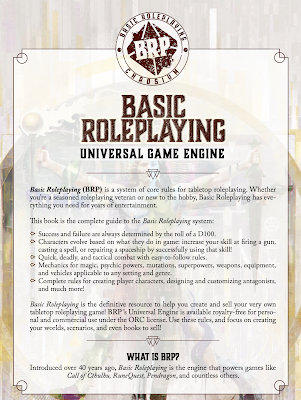A Few Brief Notes Before We Begin
I reviewed Basic Roleplaying (hereafter BRP) pretty extensively back in 2020. If you are new to the game, and want an in-depth look at it, please look there first. Here, I am going to talk mainly about the 2023 rerelease available from Chaosium here and DriveThruRPG here.
Second, in the interest of full disclosure, I have written several books for RuneQuest and contributed to others. RuneQuest is the game that BRP was invented for, but I had nothing at all to do with the 2023 rerelease. Having used the game system for forty-one years--I have literally played every Chaosium game that used BRP and a few games produced by other companies that have--I have a bias. To be clear, I love this engine.
Not a New Edition
Credited to original author Steve Perrin and the author of the 2008 omnibus "big gold book" edition, Jason Durall, the 2023 Basic Roleplaying is a revision and a rerelease of a classic. I picked those three words carefully. This is a revision and rerelease of the 2008 big gold book. Nowhere does it present itself as a new edition. If you are expecting a complete rewrite and overhaul of the game system--as with 3e, 4e, or 5e of Dungeons & Dragons--you are not going to get it. That is because of the third word I used, classic. You don't rewrite the rules of chess every time a new chess set is released. You don't need to. BRP has been played, tested, and loved all over the world for more than four decades. It remains immensely popular in Chaosium games like RuneQuest Roleplaying in Glorantha and Call of Cthulhu, not to mention games produced by other companies, such as Delta Green or Aqularre. If it isn't broken, don't fix it.
Okay Then Drew, Why A New Revision?
Because there are smart people at Chaosium.
Look, let's get the elephant out of the room first. Earlier this year the gaming industry was rocked by Wizards of the Coast and Hasbro attempting to yank the Open Game License, effectively trying to remonopolize something that had been open for 23 years. The response of other companies, led by Paizo and companies like Chaosium, was to create a true, irrevocable, open game license, the Open RPG Creative (ORC) License. This would not be held by any specific company--who might be tempted as Hasbro was to yank it later--but like similar licenses would be held in trust to ensure systems participating in the license remained open to fair use. Chaosium, which already had an open game license for Basic Roleplaying, knew this was a smart move and committed to it nearly right away. The new rerelease of BRP was to get it out under the ORC license...but instead of just re-issuing the 2008 BRP, they moved rapidly to put together the art and lay-out teams responsible for the terrific look of recent Chaosium products to make 2023 BRP worthy of being on the shelves alongside any modern RPG product.
2023 BRP is not just "sexier" than the previous release, however. This is where Jason Durall comes in. The release is cleaner, leaner, and up-to-date in terms of language.
What's In It?
The core mechanic of BRP is roll percentile dice under a skill or characteristic percentage. That's it. If you have "First Aid" at 55% on your character sheet, and you roll a 55 or less on two ten-sided dice, you succeed. Everything your character can do is right there on the character sheet, with a percentage beside it. If you don't have a skill that applies, take one of your characteristics--Strength, Constitution, Size, Intelligence, Power, Dexterity, Charisma, (and in modern settings Education)--multiply it by five and roll under the result as a percentage.
That's it. That's the entire system.
The rest is optional. Basic Roleplaying draws on previous games that have used its mechanics (RuneQuest, Call of Cthulhu, Stormbringer, Superworld, Ringworld, ElfQuest, Pendragon, Nephilim, etc) to pull together a ton of optional rules. You are not required to use any of them, but they are there in case your campaign needs them.
For example, "hit points." The default method to determine how many hit points your character has--effectively the amount of damage they can take before being incapacitated or killed--is to average your Constitution (health, endurance) and Size. But what if you want something grittier and more realistic? There is an optional rule for "hit locations," where limbs, torso, head, etc have their own hit points. What if you want a more heroic option? Use "total hit points" and add your Constitution and Size rather than averaging them.
Again, BRP is a rules buffet. Take what you like, ignore the rest.
Playing a horror game? Use the optional Sanity rules adapted from Call of Cthulhu. Running a superhero game? The "Powers" chapter is for you. "Spot Rules" has rules for almost anything you can conceive of--aimed attacks, acid, asphyxiation, aerial combat (and that is just a few of the "A's")--but again, they are options if you need them. You can very easily turn BRP into whatever sort of genre you need it to be.
What's New?
We have some goodies from the latest edition of RuneQuest. Passions are here, more (again, OPTIONAL) ways to define the psychology of your character and use them in the game. Reputation is here too, showing how recognizable your character is and what people think about them. Augments are here, using Passions or skills to provide a bonus to specific rolls. For example, you want to use your Bargain skill to negotiate a deal. You might augment it with Insight...getting a "read" on the people you are bargaining with and using that for your negotiations.
What Is Not Here?
The percentile characteristics of Call of Cthulhu are absent (easy enough to do yourself...just multiply by 5). Pushing is missing, as are bonus and penalty dice. I think the message here is "if you were thinking of using the ORC to produce Call of Cthulhu supplements outside of the Miskatonic Repository," think again. As a Jonstown Compendium author, to my mind that is fair.
Also missing is some of the simplification used in Rivers of London. But to be fair, none of that was ever BRP, it was specific to RoL.
Final Thoughts
Look, if you have the 2008 edition, you do not need the 2023. That has never been the way Chaosium played the game. Early on, D&D learned that to sell copies you have to reinvent the wheel every five years. But Call of Cthulhu barely changed through six editions, and even the 7th edition is essentially the same game. RuneQuest Roleplaying in Glorantha is basically 1978's RQ2 with additional features. Sharks have not evolved since prehistoric times because they haven't needed to. Sometimes a design is just classic.
Having said this, you should want the 2023 revision. It reads better, it is cleaner, and it has the amazing production values of modern Chaosium products. I am not throwing my copies of the big gold book out, but I am looking forward to the print version of the 2023 and it will be the one I use going forward.
This is one of the simplest, most flexible, most customizable engines in the tabletop gaming business. That is why it has lasted this long. You can talk about antiquated game systems, about out-of-date mechanics, but you are saying nothing other than personally preferring your Pokemon cards to chess. There is nothing wrong with that, but there is nothing wrong with a classic either. This is a definitive update of a definitive game system.


No comments:
Post a Comment